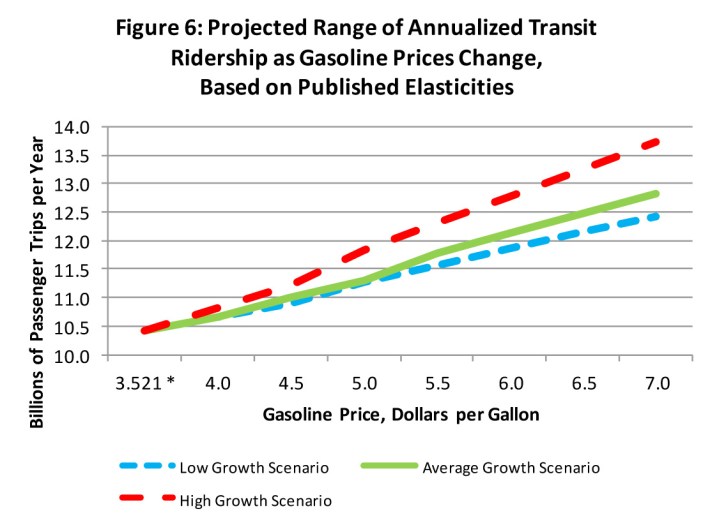
When gas prices go up, it can be a big motivator for people to start taking transit more frequently. But according to a study released by the American Public Transportation Association and Building America's Future [PDF], even when gas prices start to go down, the newly converted keep riding transit.
The report, "Volatile Gas Prices Point to Increased Use of Public Transportation," draws on independent research about "the elasticity of transit ridership" -- economist-speak for how much a change in gas prices affects transit use. As APTA points out in their press release, the results indicate an unexpected relationship between gas prices and transit ridership:
It showed that on average, nationwide public transportation systems will add nearly 200 million new trips this year even as gas prices fluctuate by as much as 50 cents per gallon.
The report carries significant implications for transportation policy as Congress continues its effort to pass a new transportation bill before the June 30 deadline. Early proposals out of the House forbade the use of Highway Trust Fund dollars to pay for transit, and while those proposals have disappeared for now, it still remains a popular viewpoint among many on the political right.
But with more Americans opting not to drive, this is precisely the wrong time to start shortchanging transit. As APTA and BAF note, "the nation’s public transportation infrastructure is not prepared to handle the long-term unpredictable nature of gas prices."
"Americans view our transportation network as one system, which is why public transportation and our road network should continue to receive funding from the highway trust fund," said Gary Thomas, chair of APTA and CEO of Dallas Area Rapid Transit, in a conference call with reporters yesterday. "We should fund, build, and plan it like one system, where our public transportation system makes our road network more efficient."
Naturally, with greater reliance on transit comes greater funding needs. Many transit agencies have had to resort to fare hikes and service cuts, even as their ridership climbs. But the dwindling power of the federal gas tax to fund needed improvements to transit has been well-documented, and Congress has been slow (unwilling, really) to enact a long-term transportation strategy.
Speaking on the same call, BAF co-chair and former Pennsylvania governor Ed Rendell predicted that very little in the way of reform will come out of the current conference process, but when the process repeats itself in 2013, "Congress and the administration have to come to grips with problems facing not only transportation infrastructure, but all infrastructure," including power, water, and broadband. Rendell said that something on the order of a 10-year comprehensive reauthorization effort was needed, as opposed to the 18-month measure which will likely result from the current conference.





